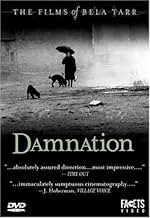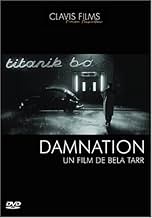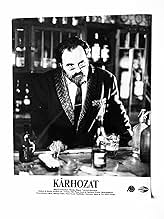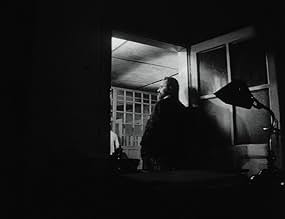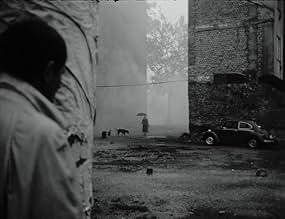IMDb-BEWERTUNG
7,6/10
7214
IHRE BEWERTUNG
Füge eine Handlung in deiner Sprache hinzuA lonely barfly falls in love with a married bar singer.A lonely barfly falls in love with a married bar singer.A lonely barfly falls in love with a married bar singer.
- Regie
- Drehbuch
- Hauptbesetzung
- Auszeichnungen
- 2 Gewinne & 1 Nominierung insgesamt
Empfohlene Bewertungen
The film that launched director Béla Tarr into international attention, Kárhozat is the Hungarian's first major investigation of the nature of humanity.
Trailing the exploits of alcoholic depressive Karrer, Kárhozat presents us with a view of a desolate and decrepit Hungarian town. He spends his days wandering from bar to bar, obsessing over a married lounge singer and part-time lover whom he longs to elope with. Passing off a job to collect a package to the husband, he buys himself three days alone with the object of his desires.
As is now his trademark, Tarr brings us the minimal number of shots: slow, winding, thoughtful and beautiful. His approach is simultaneously simple and complicated, showing us at the same time nothing and everything. The aesthetic of the film is astounding, beauty created wonderfully in the chaos and destruction of the landscape. The brooding intensity of the omnipresent coal trains dominates the work, an indicator of lost industry and decline. Miklós Székely leads the cast with the perfect stoic facade, his granite face holding back the weight of an emotional past and the crippling need for escape. The sinister and critical bartender gives us Karrer's true opinion of himself, one he would rather not face up to, whilst the sagacious old woman provides the film's sensibility and reason. The plot itself is not so important as the camera's journey and the character's silent ruminations, leading unavoidably to a wonderful climax and one which does exactly what it should: causes us to question our own lives and the oddity of humankind.
With beautiful, paced, unconventional direction, Tarr gives us an intimate portrait of ourselves and our world. Achieving an incredible amount with a minimalistic approach, the film is entrancing, mysterious, and inspiring. Telling us as much with his landscapes as with his characters, Tarr's Kárhozat is a testament to the brilliance of this creative juggernaut.
Trailing the exploits of alcoholic depressive Karrer, Kárhozat presents us with a view of a desolate and decrepit Hungarian town. He spends his days wandering from bar to bar, obsessing over a married lounge singer and part-time lover whom he longs to elope with. Passing off a job to collect a package to the husband, he buys himself three days alone with the object of his desires.
As is now his trademark, Tarr brings us the minimal number of shots: slow, winding, thoughtful and beautiful. His approach is simultaneously simple and complicated, showing us at the same time nothing and everything. The aesthetic of the film is astounding, beauty created wonderfully in the chaos and destruction of the landscape. The brooding intensity of the omnipresent coal trains dominates the work, an indicator of lost industry and decline. Miklós Székely leads the cast with the perfect stoic facade, his granite face holding back the weight of an emotional past and the crippling need for escape. The sinister and critical bartender gives us Karrer's true opinion of himself, one he would rather not face up to, whilst the sagacious old woman provides the film's sensibility and reason. The plot itself is not so important as the camera's journey and the character's silent ruminations, leading unavoidably to a wonderful climax and one which does exactly what it should: causes us to question our own lives and the oddity of humankind.
With beautiful, paced, unconventional direction, Tarr gives us an intimate portrait of ourselves and our world. Achieving an incredible amount with a minimalistic approach, the film is entrancing, mysterious, and inspiring. Telling us as much with his landscapes as with his characters, Tarr's Kárhozat is a testament to the brilliance of this creative juggernaut.
Damnation (1988) ****
Although he made a number of feature films previous to Damnation, this is where Bela Tarr found his trademark style. It was also his first collaboration with novelist and country man Laszlo Krasznahorkai; a collaboration which continues to this day.
The film opens with now trademark Tarr style, watching mining carts travel along with their loads for a few minutes (yes minutes). The camera slowly pulls back to reveal Karrer (Miklós Székely) shaving. He's a lonely loser, slowly drinking himself to death at the Titanik Bar. He is in love with and sleeping with the lounge singer there (Vali Kerekes). The problem, however, is that she is married, and has made no secret of wanting to end their affair. That when he asks her why she doesn't love him, and she replies "I love you and you know it," is of no real matter to her.
Karrer is offered a smuggling job by the bar's shady owner. He decides to offer the job to the singer's husband, who has built up a substantial debt and is in danger of being imprisoned for it. He accepts, and Karrer wins himself three days to swoon the singer. She denies him, nevertheless sleeping with him in perhaps the least passionate sex scene ever filmed. A bitter Karrer decides he will turn in to the authorities her husband when he returns from his smuggling job, leaving her alone and thus making him now the logical option. By the end, the lives of Damnation's characters will be as broken and desolate as the crumbling town in which they live.
Damnation plays as love triangle, grounded out over nearly two hours. Tarr's long shots and elegantly bleak black and white photography follows ever so slowly the action. The lighting is impeccable, creating ghostly silhouettes, dusty and dim barrooms, and elegant and shimmering light bouncing of the face and hair of the lounge singer. As characteristic of Bela Tarr, the cinematography is stately and assured, breathtaking and deliberate. He films his characters and their town as assuredly and respectfully as possible. The town, and the dogs which walk its streets, hint at the apocalyptic undertones of the film, and transcends all emotions, or lack there of.
I have had reservations about Damnation in the past, confident that it was film-making at its very best, sublimely atmospheric and tonal, but unsure whether or not just how well it worked, particularly in relation to Tarr's two formidable masterpieces, Satantango and Werckmeister Harmonies. Those films have something mammoth and intimidating about them: Satantango, with its titanic length, clocking in at over 7 hours, all in the same style and minimal narrative; Werckmeister Harmonies with its bizarre metaphysical underpinnings and suggestive philosophy. Those films have a ground out dreamlike or perhaps nightmarish quality to them, particular Werckmeister Harmonies. After my fourth of fifth viewing of Damnation, I'm now assured that it does in fact work particularly when you avoid getting hung up on Tarr's other films. I'm also assured of its greatness. Damnation is a masterpiece of film-making. It draws parallels with the Italian realist films of the 50s and early 60s, as well as the minimalist transcendentalism of the films of Robert Bresson, but all the while invoking a dreamlike quality that keeps the viewer removed at just the right distance for a gritty but transcendent experience.
Although he made a number of feature films previous to Damnation, this is where Bela Tarr found his trademark style. It was also his first collaboration with novelist and country man Laszlo Krasznahorkai; a collaboration which continues to this day.
The film opens with now trademark Tarr style, watching mining carts travel along with their loads for a few minutes (yes minutes). The camera slowly pulls back to reveal Karrer (Miklós Székely) shaving. He's a lonely loser, slowly drinking himself to death at the Titanik Bar. He is in love with and sleeping with the lounge singer there (Vali Kerekes). The problem, however, is that she is married, and has made no secret of wanting to end their affair. That when he asks her why she doesn't love him, and she replies "I love you and you know it," is of no real matter to her.
Karrer is offered a smuggling job by the bar's shady owner. He decides to offer the job to the singer's husband, who has built up a substantial debt and is in danger of being imprisoned for it. He accepts, and Karrer wins himself three days to swoon the singer. She denies him, nevertheless sleeping with him in perhaps the least passionate sex scene ever filmed. A bitter Karrer decides he will turn in to the authorities her husband when he returns from his smuggling job, leaving her alone and thus making him now the logical option. By the end, the lives of Damnation's characters will be as broken and desolate as the crumbling town in which they live.
Damnation plays as love triangle, grounded out over nearly two hours. Tarr's long shots and elegantly bleak black and white photography follows ever so slowly the action. The lighting is impeccable, creating ghostly silhouettes, dusty and dim barrooms, and elegant and shimmering light bouncing of the face and hair of the lounge singer. As characteristic of Bela Tarr, the cinematography is stately and assured, breathtaking and deliberate. He films his characters and their town as assuredly and respectfully as possible. The town, and the dogs which walk its streets, hint at the apocalyptic undertones of the film, and transcends all emotions, or lack there of.
I have had reservations about Damnation in the past, confident that it was film-making at its very best, sublimely atmospheric and tonal, but unsure whether or not just how well it worked, particularly in relation to Tarr's two formidable masterpieces, Satantango and Werckmeister Harmonies. Those films have something mammoth and intimidating about them: Satantango, with its titanic length, clocking in at over 7 hours, all in the same style and minimal narrative; Werckmeister Harmonies with its bizarre metaphysical underpinnings and suggestive philosophy. Those films have a ground out dreamlike or perhaps nightmarish quality to them, particular Werckmeister Harmonies. After my fourth of fifth viewing of Damnation, I'm now assured that it does in fact work particularly when you avoid getting hung up on Tarr's other films. I'm also assured of its greatness. Damnation is a masterpiece of film-making. It draws parallels with the Italian realist films of the 50s and early 60s, as well as the minimalist transcendentalism of the films of Robert Bresson, but all the while invoking a dreamlike quality that keeps the viewer removed at just the right distance for a gritty but transcendent experience.
Hey! Crazy movie! Oh Gaad it was so boring and depressing! Actually I felt quite privileged to have watched this film. Some people are NOT making films with the intention of being popular, and Bela Tarr is one of them. Satantango is 7 and a quarter hours long, and this one stretches an existential eternity across its 2 hours, bringing us 2 hours closer to death but hopefully nearer to life.
I was looking for symbolic significance from the first achingly long shot, but we were lucky enough to have Tarr interviewed in the cinema afterwards. He scuppered any suggestion of symbolism in his films, insisting that the fact of pointing a camera lens only at things that exist means that metaphysics and allegory are impossible in film. More than a hint of his totalitarian background in his didactic description of his work.
I felt like I had learned something from this film. I thought it showed how life in Hungary can be depressing, a struggle, apparently hopeless, but that the hopelessness only really comes from inside the person. A desperate, selfish man lurks around the drab industrial landscape, fixated on his one motivation, the woman who is his object of desire. He hatches a plan to get rid of her husband. Afterwards the director stated explicitly that the plot is deliberately simple and even banal - the main character delivers one monologue about how all stories dissipate and all heroes dissipate and die away. He stated that the dogs and the rain which both haunt the film are characters and have stories as much as the people.
If you get the chance, go and watch it. It's a proper work of art, there's nothing wrong with it!!!!!!!!!!!
I was looking for symbolic significance from the first achingly long shot, but we were lucky enough to have Tarr interviewed in the cinema afterwards. He scuppered any suggestion of symbolism in his films, insisting that the fact of pointing a camera lens only at things that exist means that metaphysics and allegory are impossible in film. More than a hint of his totalitarian background in his didactic description of his work.
I felt like I had learned something from this film. I thought it showed how life in Hungary can be depressing, a struggle, apparently hopeless, but that the hopelessness only really comes from inside the person. A desperate, selfish man lurks around the drab industrial landscape, fixated on his one motivation, the woman who is his object of desire. He hatches a plan to get rid of her husband. Afterwards the director stated explicitly that the plot is deliberately simple and even banal - the main character delivers one monologue about how all stories dissipate and all heroes dissipate and die away. He stated that the dogs and the rain which both haunt the film are characters and have stories as much as the people.
If you get the chance, go and watch it. It's a proper work of art, there's nothing wrong with it!!!!!!!!!!!
In a town that is quite possibly the wettest place on Earth, the permanently raincoat-clad "Karrer" (Miklós Székely B) goes through the motions with a life that is little more animated than his dreich surroundings. What sustains him through the grand ennui of his existence is his love for the married singer in the gloomy "Titanik" bar (Vali Kerekes) for whom he declares, repeatedly, his undying love and for whose husband "Willarsky" (Gyula Pauer) he has little but contempt. Luckily for him, though, the guy is in almost permanent debt so is away frequently enough for the two to indulge their relationship, infatuation, addiction now and again. That's about the height of it. Can this ever decreasing circle ever change? What's quite intriguing about this cinematic festival of monochrome melancholia is that the story is almost irrelevant to what Béla Tarr seems to be offering us here. The photography is dank and dreary, the constant tracking shots, panning shots, lingering close ups of the rain dripping from branches or the faces of the customers in the bar - none of those actually do anything to support the plot, but they add a delicious richness to the whole allure of this film. There's a song - almost as depressing as the weather, completed by a gentle saxophonist that I felt rather summed up the whole ambiance of this glacially paced exercise in bleakness. I'm no film critic and am not in a position to write some extensive exposition on what motivated the director or how original his techniques at story telling are, I can only judge what was put before me for two hours and though, yes, at times it is downright dull, at other times it was a bit like wandering through an art gallery where the light (or shade) brought something out of the blandness of the scenario. It won't be for everyone as there really isn't that much actually happening, the dialogue is pretty sparse and the repetitive nature of the plot development might be risky for an audience required to focus for a couple of hours where the sight and sound of constant rain might just start to feel like a drip on your head. I'm not sure I'd ever watch it again - but as an exercise in epitomising the depressiveness of the routine, the hopeless and the pedestrianism of daily life, it's worth a watch. You probably ought to watch it in a cinema, though - at home on a television it will lose much of it's photographic distinction and you might just be tempted to hit fast-forward now and again.
I watch Bela Tarr's films over again with endless fascination. The length is not a problem: No longer that many pieces of music. If you can concentrate through a Wagner opera and I hope you can, then a Tarr film is not very long. All the films are very much products of team work but lead by an autocratic man who knows exactly what he wants, hence the seam free quality of the experience, It is that, rather than the length which requires the concentration. I have not found it mentioned often enough but there is much humour in his films, Karrer does a reprise of Gene Kelly, which is then itself parodied near the end of the film. Damnation is maybe still my favourite, I suppose for the mesmerising way sound is used to structure a complex web of association, but then all of the available late films has so much to offer
Wusstest du schon
- WissenswertesWith "Kárhozat / Damnation", the first of his collaborations with novelist Laszlo Krasznahorkai, Bela Tarr adopts a formally rigorous style, featuring long takes and slow tracking shots of the bleak landscape that surrounds the characters.
- PatzerIn the Dance/Party scene, the band and the music are clearly out of sync.
- Zitate
The Singer: I like the rain. I like to watch the water run down the window. It calms me down. I don't think about anything. I just watch the rain.
- VerbindungenEdited into Gli ultimi giorni dell'umanità (2022)
Top-Auswahl
Melde dich zum Bewerten an und greife auf die Watchlist für personalisierte Empfehlungen zu.
- How long is Damnation?Powered by Alexa
Details
- Laufzeit
- 2 Std.(120 min)
- Farbe
- Sound-Mix
- Seitenverhältnis
- 1.66 : 1
Zu dieser Seite beitragen
Bearbeitung vorschlagen oder fehlenden Inhalt hinzufügen



